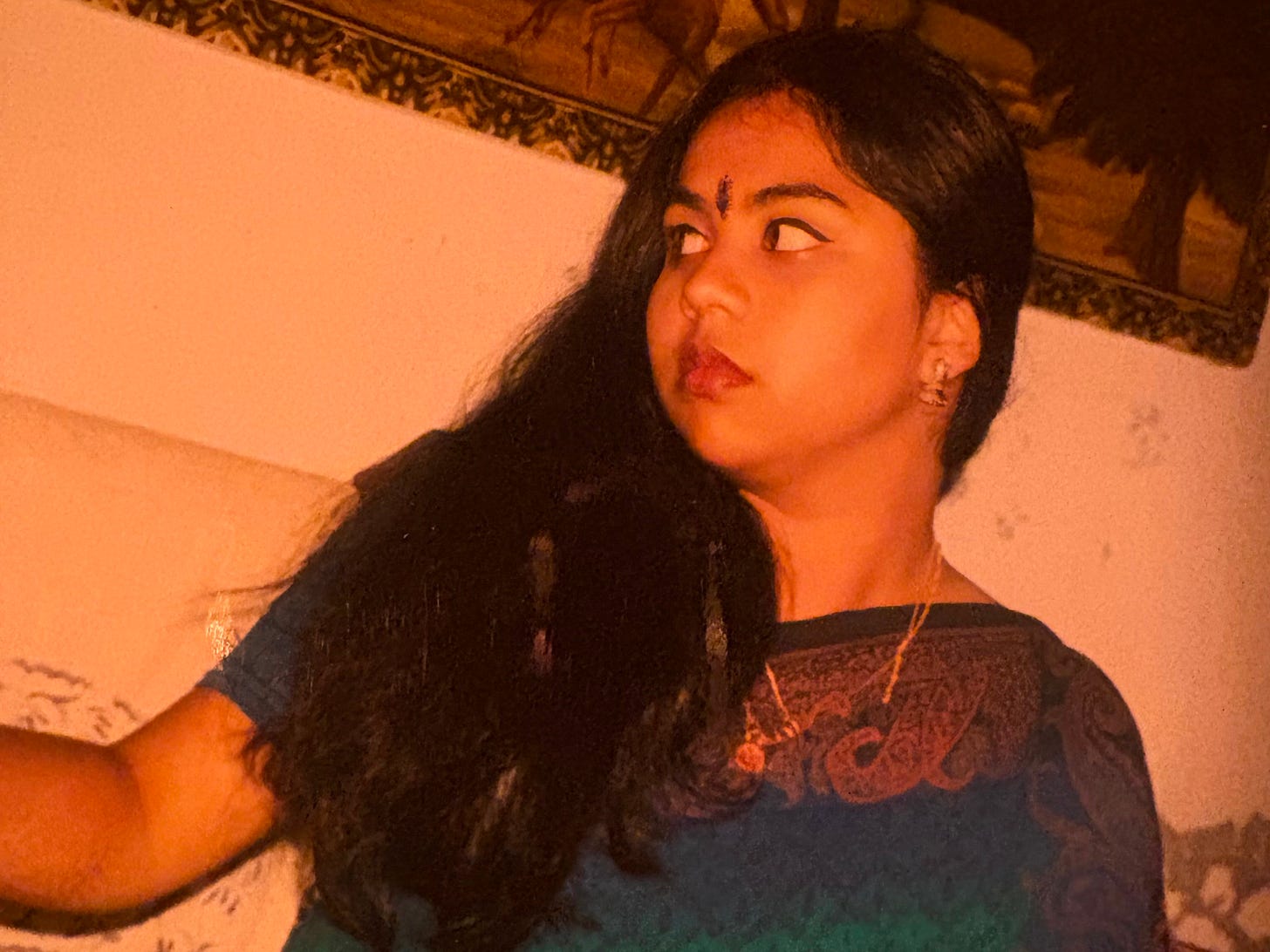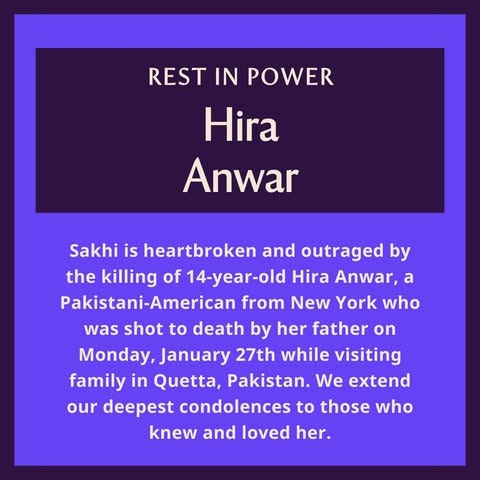The Deadly Price of an Immigrant Daughter's Freedom
Hira Anwar's murder is a stark reminder of why we can't afford to ignore intergenerational trauma and gender-based violence in our communities.
1999, a brutally hot June day and the last day of ninth grade. I was washing off the grime of the subway in the cold shower in our small two-bedroom apartment in Queens when a loud knock interrupted my fifteen-year-old thoughts.
"Get ready. You're going to Bangladesh tomorrow,” Papa’s voice sounded uncharatersitically stern. The front door slammed behind him.
I had no clue what was going on, but sure enough, the next day, I was on a one-way flight to Bangladesh, headed to live with my nani—my mom’s mom.
I was dumbfounded. My dad was not a disciplinarian at all. In fact, he was unconventional in terms of a South Asian Muslim father, because he really never lay down any rules—he was too much of a free spirit himself for that. And yet his instinct was still to send me back home because his sister said she had seen me walking around with a boy. My mother, who ruled our home with an iron fist, was dead-set against sending me to Bangladesh without either of my parents. She didn’t believe sending me away was the solution to my disobedience.
Once I arrived, I was jetlagged, lost, confused, and honestly, a little ashamed. I overheard my nani and her sister talking about me while I was asleep in the same room. They were wondering why I'd been sent back. And I also wondered what prompted my father to cast me away. I knew that dating was a cardinal sin as a Muslim girl, but it didn’t make sense why when it was a normal rite of passage for everyone else around me, other than the girls who grew up in households like mine.
Naively, I kind of believed that the majority of that intergenerational trauma ended with millennial South Asian American and diaspora girls. But the story of Hira Anwar, a 14-year-old Pakistani-American girl from New York who was shot dead by her father and uncle, shocked my senses last week.
Hira grew up trying to balance two cultures, just like I did. She wanted to express herself and connect with the world outside of her family’s boundaries. She did that through TikTok—posting dance videos, being a teenager, and living the way her generation does.
The men in her family were furious about the fact that she was posting videos online, an innocuous act normalized in today’s world.
At first, Hira’s father tried to cover it up. He told the police that some gunmen had opened fire on them while they were driving to her uncle’s house. But after collecting evidence and talking to witnesses, the police started to get suspicious. Eventually, they arrested Hira’s father—an Uber driver in New York—and her uncle, on suspicion of murder. In his confession, Hira’s father admitted he didn’t like her clothing, her lifestyle, and especially her social relationships.
Hira’s death highlights something that’s too often swept under the rug—femicide. This isn’t just about a girl being murdered for defying family expectations. It’s about systemic violence that women and girls face when they try to claim their agency.
Gender-based violence is unfortunately common within South Asian communities—Kavita Mehra, the executive director of Sakhi for South Asian Survivors, a New York-based nonprofit, pointed out toThe New York Times that nearly half of South Asians in the U.S. report experiencing some form of gender-based violence in their lifetime.
Reporting on cases like Hira’s gets tricky, especially when it involves South Asian Muslim families. There's a real risk of reinforcing harmful stereotypes about our community. The response to her murder has been shockingly quiet—aside from a few posts on social media, like Bushra Apa—a Bangladeshi-American sex educatior and content creator—there’s been very little mainstream coverage.
I get it—we’re often painted with one broad brush that says we’re all stuck in old-world values, holding on to traditions that don’t make sense in a modern context. It’s the same old story: traditional immigrant parent trying to stifle their American daughter’s sense of self. But it’s more complicated than that—and we need to talk about it, not just for Hira, but for all the girls who might still be fighting to break free.
The impulse to send your daughter back to the motherland if she gets out of line is common for Desi fathers. Mine tried the part of strict father on for size and eventualy realized he missed me too much and and showed up to take me home. That experience had turned out to be an unexpectedly fun summer of getting to know the motherland and bonding with my grandmother. But make no mistake, it was intended to be punishment for daring to explore my sexuality and desires.
Living a double life was and is the norm for young girls and women from so many immigrant communities. We are never fully allowed to be ourselves and so many of us never get to know who we truly are. I had fit right into life in Bangladesh. I dressed modestly, spoke the language fluently, and charmed everyone I met. I was straight out of a character of a coming-of-age Bollywood movie waiting for the hero to rescue her.
But, of course, that's what I had been taught to do. My mom's cousins, two single women in their early twenties, commented on my "innocent face" and how beautiful and youthful I looked. They still talk about how I had this well-mannered, cultured vibe, despite growing up in the U.S.
I honestly feel lucky that I didn't have social media to "out" me. Back then, it was mostly aunties on the street snitchin’ on us.
Hira's death is a painful reminder that fighting for freedom and self-expression—a fundamental teenage right of passage no matter where you come from—can come with deadly consequences. We cannot afford the luxury of silence, nor can we be paralyzed by the fear of feeding into stereotypes. As uncomfortable as it is to acknowledge painful truths that sometimes align with harmful narratives, shutting down our senses will not save the next girl.
This is about more than individual tragedies. It's about the collective burden girls and women carry—not just in South Asian communities, but everywhere that patriarchy finds fertile ground. We must wrestle with these complex realities, speak their names, and create spaces where daughters from our community can breathe freely. Where their lives are not a negotiation, but a right.
Hira deserved that right. So do all the girls who come after her.




Thank you for this thoughtful and helpful take on the murder of Hira Anwar. As someone who grew up far outside desi culture, it helps to hear your story so I can know how to listen and speak well on HIra's death. Our women and girls deserve better from us South Asian men.
I understand your hesitation to reinforce stereotypes. Unfortunately, as with so many issues in the U.S., we conveniently overlook our homegrown sins. One hardly needs to look at immigrant or Muslim populations to find examples of violence toward women or femicide. There's plenty of that born and raised right here. The more U.S.-born and nth-generation Americans reckon with their own misogyny, the less stigmatizing it will be for immigrant populations to call out their own. Thank you for sharing, Jennifer.